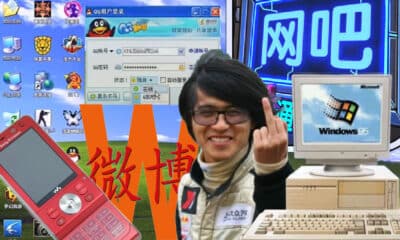China Celebs
A Pair of Socks for US$100? A Livestream Session Exposing Wealth Inequality in Chinese Society
A casual remark made by Chinese actress Zhang Yuqi regarding the price of socks has ignited discussions surrounding the stark disparity between the perspectives of celebrities and the financial realities experienced by ordinary individuals.
Published
2 years agoon
By
Zilan Qian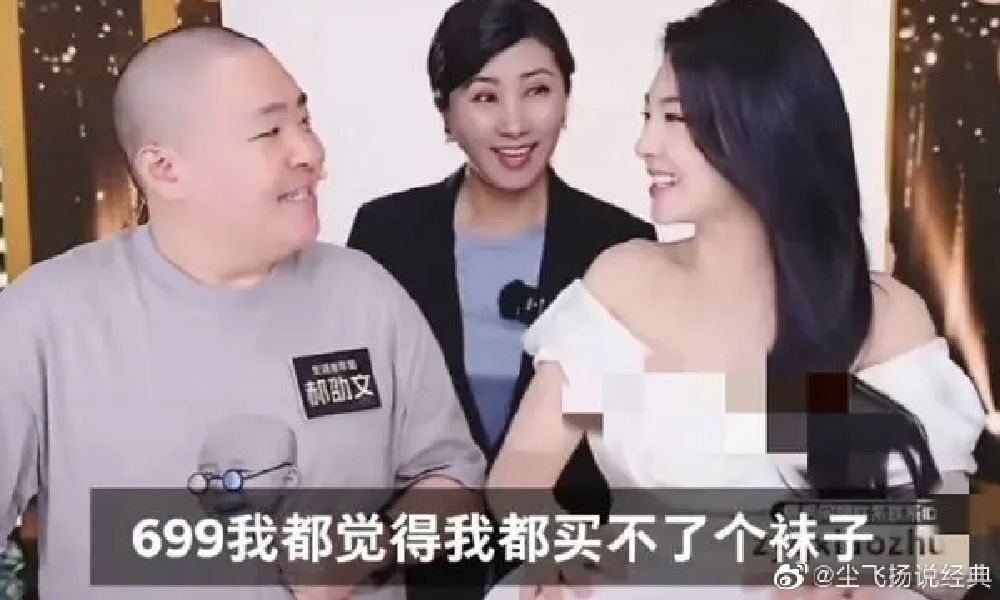
Amidst rising joblessness, surging prices, and economic challenges in China, it is not easy to get by for many people. So when Chinese actress Zhang Yuqi (张雨绮) recently suggested that 699 yuan (about US$100) would not be enough money to buy a pair of socks, her comment sparked discussions about celebrities flaunting their wealth and income inequality.
The incident took place during a live broadcast where Zhang Yuqi was participating in product sales alongside guest speaker Hao Shaowen (郝劭文). The focus of the broadcast was a luxury cashmere blanket priced at 1,699 yuan ($238). In the course of the session, Hao proposed reducing the price to 699 yuan ($100). In response, Zhang Yuqi made the remark, “699 yuan? I don’t even think I can buy a pair of socks with that amount.”
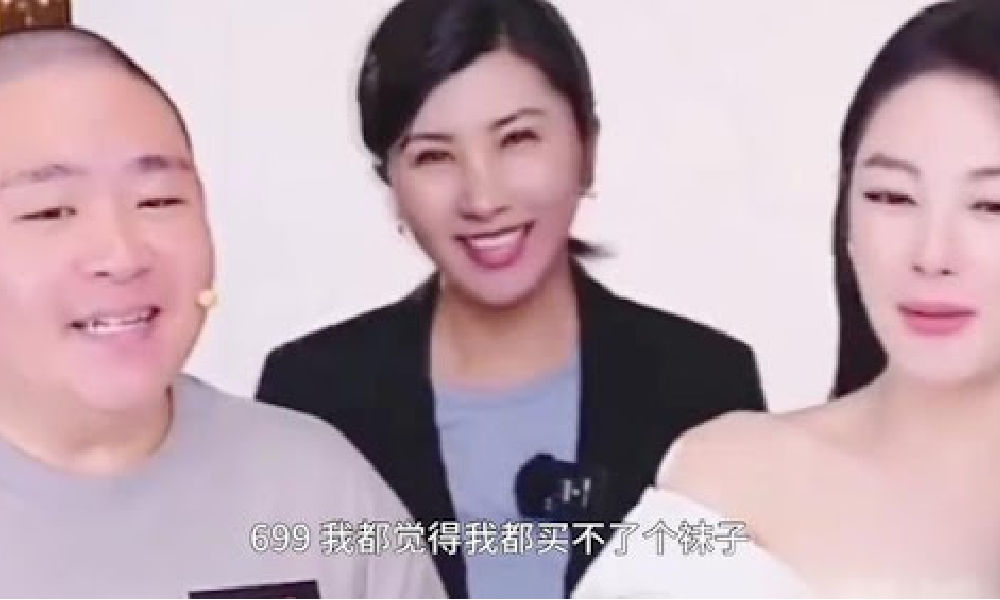
Screenshot of the live stream session when Zhang said “699 yuan? I don’t even think I can buy a pair of socks with that amount” (source).
Hao continued to emphasize that 699 yuan was already an excellent offer, highlighting the high cost of wool. Zhang echoed his sentiment, emphasizing the exorbitant price of wool. Eventually, the price of the blanket was further discounted to 369 yuan ($51) for a 1.5-meter size cashmere blanket.
Zhang Yuqi’s statement about 699 yuan not being sufficient to buy a pair of socks quickly grabbed attention online, leading to intense debates.

A screenshot of Zhang’s Weibo post on June 11th. Zhang apologized and explained that her intention was misunderstood due to her failure to effectively communicate her point.
On June 11th, Zhang issued an apology for her remark, explaining that her intention was to highlight the high cost of wool and that certain wool socks cannot be obtained for 699 yuan (#张雨绮致歉#). However, despite her apology, the discussions surrounding the incident did not subside.
“Zhang Yuqi doesn’t need to apologize. 699 yuan [$100] is truly not enough for celebrities to buy a pair of socks”
What was Zhang’s intention behind the controversial statement? Some individuals view Zhang’s comment as a calculated move designed to showcase her wealth.
Associate Professor Liu Chunshen from the Central University of Finance and Economics suggested that such a remark could be a tactic employed by celebrities to display their extravagant lifestyles and attract attention, which could potentially translate into financial gains (#学者称明星不该边赚钱边说风凉话#).
On the other hand, some argue that Zhang’s statement simply reflects the inherent luxury associated with the everyday lives of celebrities. One Weibo user shared a series of photos showcasing the prices of handbags, watches, and hats worn by various celebrities as part of their personal outfits.
The examples included jeans worn by Chinese actress Angelababy priced at 48,500 yuan ($6,805) and Chinese singer Roy Wang’s watch priced at a staggering 16.8 million yuan ($2,357,230).

One of the photos included in the Weibo post. The photo shows Angelababy’s personal outfit she wore at the airport on June 2nd, 2023, which includes a Hermès Faubourg Birkin handbag of around 2 million yuan (about $280,000), a Celine cap of 3700 yuan ($520), and a pair of Louis Vuitton shoes of 10000 yuan ($1400).
In the accompanying post, the Weibo user wrote, “Zhang Yuqi doesn’t need to apologize. 699 yuan is truly not enough for celebrities to buy a pair of socks,” implying that the seemingly exorbitant price of the socks is just a regular expense for these celebrities when compared to the extravagant items they commonly wear in their daily lives.
“Celebrities have attained an income level that is unimaginable for ordinary individuals in China”
Amidst the varying interpretations of Zhang’s statement, there is widespread agreement among netizens that the significant income gap is the primary driving force behind the online discussions.
Professor Liu, in his analysis of the incident, also asserts that income inequality is the core reason why netizens find Zhang’s statement unacceptable. Likewise, Weibo users who believe that Zhang had no intention to flaunt her wealth also acknowledge that celebrities have attained an income level that is unimaginable for ordinary individuals in China.
The potential earnings of celebrities have been a topic of discussion, with a prevailing consensus suggesting that they can earn approximately 2.08 million yuan (about $291,000) per day. This estimation originated from actress Zheng Shuang’s alleged earnings of 160 million yuan ($22.35 million) for the film A Chinese Ghost Story (倩女幽魂), averaging around 2.08 million yuan per day over a span of 77 days.
While Zheng’s case may be regarded as somewhat exceptional, it is widely known that celebrities earn substantial incomes. Reports of various celebrities earning 100 million yuan ($14 million) in six years, 8 million yuan ($1.1 million) in four days, or 1.8 million yuan ($252,000) per episode have been extensively circulated in recent years.
In stark contrast, the disposable income of residents nationwide was 36,882 yuan (about $5,100) in 2022, according to the National Bureau of Statistics of China.
“Chinese actor Wang Chuanjun shared he only had 1 million yuan ($140,000) left in his bank account, which caused him great distress.”
This is not the first time celebrities’ statements on prices trigger controversies, indicating a sense of disconnect from the reality of everyday expenses.
In 2021, Su Mang, the former CEO of a fashion group and former editor-in-chief of Harper’s BAZAAR China, also attracted attention with her remarks on prices. During the variety show “50km Taohuawu (三十里桃花坞),” when actress Song Dandan suggested a daily food expense of 650 yuan ($91) per person, Su immediately exclaimed, “650 yuan is truly not enough. Don’t you have milk and eggs in the morning? We should have better meals! I can’t settle for such low-quality food.”
In response to this incident, some commenters mentioned that 650 yuan could cover their food expenses for an entire month.
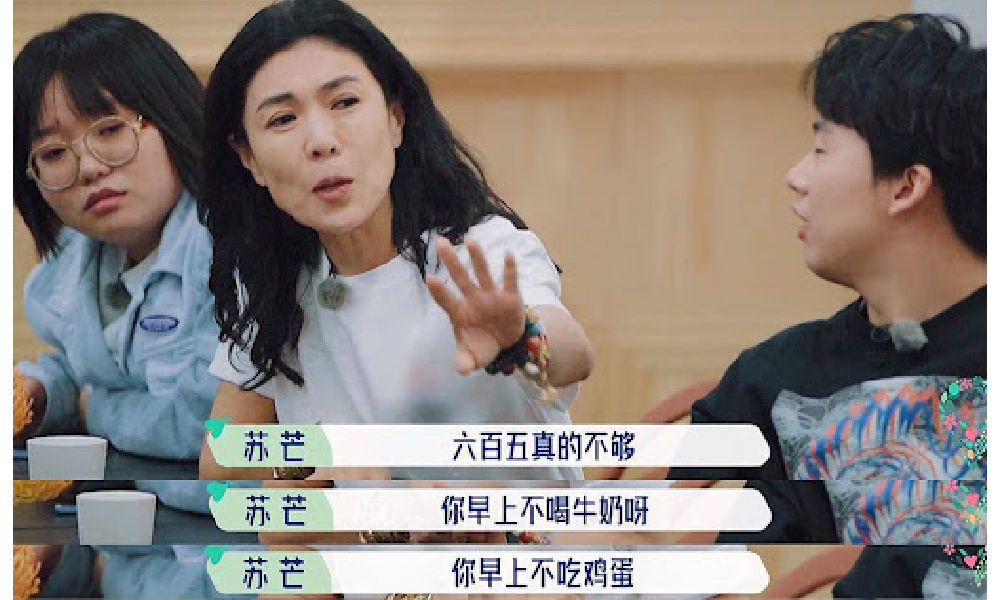
Photo of Su Mang claiming that 650 is not enough and questioning whether people have eggs and milk for breakfast in the variety show (via Sohu).
Not only do some Chinese celebrities seem to live in another world where everything costs more, but they also live in a place where “poverty” is differently defined.
Actor Wang Chuanjun (王传君) once shared in an interview that during his most financially challenging period, he just had 1 million yuan (about $140,000) left in his bank account, which caused him great distress.
Similarly, singer Eason Chan expressed unease during the Covid-19 pandemic when he had “only” 30 million in his bank account. (While the original report did not specify the currency, we assume it to be in HK dollars, which would be approximately $3.83 million.)

(Photo of the interview when Wang Chuanjun expressed his anxiety when finding out that he “only” had 1 million yuan left (via Baijiahao)
“It’s too divided,” one Weibo user wrote:
“On one side, there are individuals who earn 2.08 million yuan per day, lacking education and expertise, yet dominating a significant portion of public opinion with their extravagant life of luxury. On the other side, there is the marginalized lower class (probably including most of you and me) who are squeezed to the point of being voiceless, pushed to the brink of collapse and even driven to end their lives due to the pressure of just tens of thousands of yuan.”
In the thread below this post, one commenter provided an example to support the argument of individuals being driven to the point of ending their lives. They recounted a case that was recently disclosed by the court, involving a lonely elderly person who attempted suicide by consuming pesticides after being robbed of 45,000 yuan ($6,287).
One Weibo user provided a perspective from common individuals with a relatively average salary:
“Considering a monthly income of 5,000 yuan (about $700) and no expenses, it would be possible to accumulate 60,000 yuan ($8,383) in a year. Hypothetically, if someone were to retire at the age of 60 without any expenses, they could potentially have 3.6 million yuan (about $503,000) saved up.”
However, this already impractical scenario seems far from reality for many people across China, particularly those residing in smaller cities, who struggle to reach an annual salary of 60,000 yuan.
“I no longer know how to place trust in the notion that hard work guarantees success”
This striking disparity between the lifetime earnings of average salary earners and the daily earnings of celebrities evokes a sense of both indignation and helplessness. “Isn’t it absurd when some people discuss earning 2.08 million yuan per day? I also find it quite amusing. It’s genuinely pitiful and disheartening,” expressed the user in response to the calculations.
By this point, Zhang’s livestream comment about the ‘699 yuan socks’ has transcended a mere debate about whether she was flaunting her wealth or not. When coupled with other instances where celebrities divulge their astounding earnings and extravagant lifestyles, this incident has become catalyst for individuals to question the ideals of equality and meritocracy in society.
“I no longer know how to place trust in the notion that hard work guarantees success,” wrote one Weibo user.
In these online discussions about privilege and disillusionment with meritocracy, Xiangzi’s name frequently comes up. Xiangzi is a character in Lao She’s book “Rickshaw Boy.” He is a poor rickshaw puller who dreams of escaping the lower class and achieving wealth through hard work. Despite his persistent efforts, he faces continuous failures. In the end, he gives up on working hard and becomes a lazy good-for-nothing.
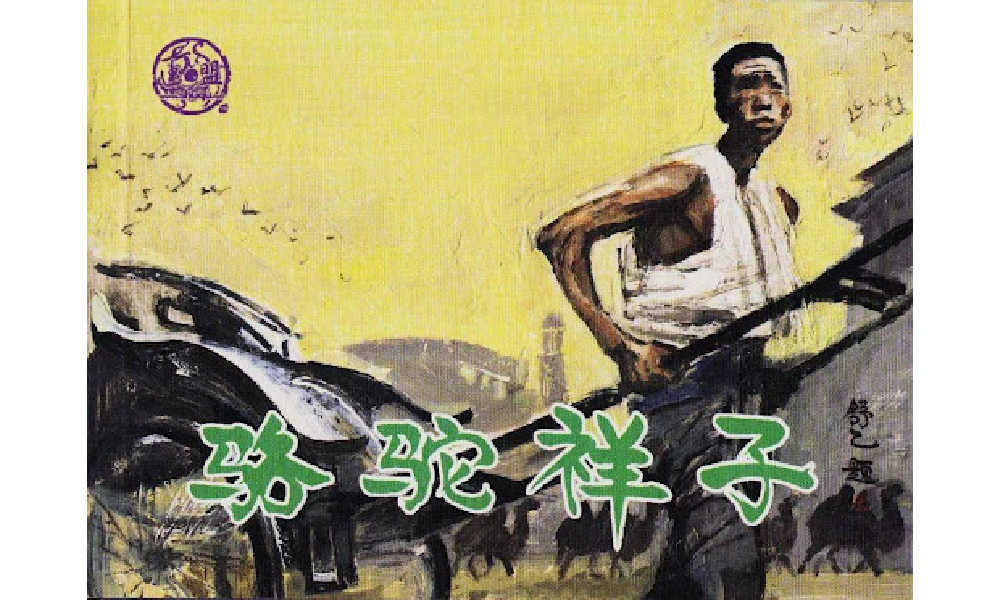
The book ‘Rickshaw Boy’ (骆驼祥子) by author Lao She.
“Is this still the era where hard work can change the future?” one commenter wonders.
It is clear that the extreme contrast between celebrity earnings and the average disposable income of ordinary people is a topic that many people care about. By now, the hashtag ‘Zhang Yuqi Says She Can’t Buy Socks for 669 Yuan’ (#张雨绮说699我都买不了袜子#) has garnered over 860 million views on Weibo while Zhang Yuqi’s apology received over 410 million clicks, and the influx of comments discussing wealth inequality in China shows no signs of stopping.
“Today I saw workers sleeping in the shade next to a supermarket in the scorching heat. Their faces looked thin, their clothes looked dirty,” one commenter wrote: “How ironic is it that they work so hard and may not even earn 699 yuan in a day? It makes you wonder, with such circumstances, how can societal hostility not increase? It’s a sick society.”
Also read: Online Discussions over Income: “When My Dad Was Young, His Monthly Salary Was 2000 Yuan (And I Still Earn the Same) [link here]
By Zilan Qian
Get the story behind the hashtag. Subscribe to What’s on Weibo here to receive our newsletter and get access to our latest articles:
Spotted a mistake or want to add something? Please let us know in comments below or email us. First-time commenters, please be patient – we will have to manually approve your comment before it appears.
©2023 Whatsonweibo. All rights reserved. Do not reproduce our content without permission – you can contact us at info@whatsonweibo.com.
Zilan Qian is a China-born undergraduate student at Barnard College majoring in Anthropology. She is interested in exploring different cultural phenomena, loves people-watching, and likes loitering in supermarkets and museums.

You may like
China Celebs
Beauty Influencer Du Meizhu Accused of Scamming Fan Out of $27K
Published
5 months agoon
June 27, 2025
🔥 Quick Take: Trending in China
This is a brief update from our curated roundup of what’s trending in China this week. A version of this story also appears in the Weibo Watch newsletter. Subscribe to stay in the loop.
Chinese beauty influencer and livestreamer Du Meizhu (都美竹) is facing online backlash this week after a former female fan filed a police report accusing her of scamming her out of nearly 200,000 yuan (approx. US$27,800).
The fan, known online as Sister Bing (Weibo handle @冰点人a冰点), has come forward with detailed allegations, claiming Du began swindling her in 2022.
Du Meizhu rose to national prominence in 2021 when she was 19 years old and became the first person to publicly accuse Chinese-Canadian pop star Kris Wu (吴亦凡) of rape and sexual misconduct. After at least 24 more victims also came forward, Wu was formally arrested on suspicion of rape in mid-August 2021 and was later sentenced to 13 years in prison.
It was around this time that ‘Sister Bing,’ whose real name is Ms. Zhu (朱, born 1979), started following Du Meizhu on social media. As a hard-working single mother of a daughter, she said she sympathized with Du and wanted to show her some support. In a Weibo post published in 2024, she detailed how Du Meizhu began noticing Zhu’s online interactions in early 2022 and added her as a friend on WeChat.
In private conversations, Du shared complaints about her difficult life, and as the two talked more and more, Zhu began transferring small amounts of money to help. Over time, Du said she needed money for various things—from financial support for school to legal disputes and expensive medical treatments for family members. Between 2022 and 2023, Zhu claims she transferred nearly 200,000 yuan in total.
At the end of 2023, Zhu–who works as a taxi driver–urgently needed money due to a family crisis. She reached out to Du to ask if she could repay the money. According to Zhu, she only returned 30,000 yuan (US$4,180) and refused to pay more, even though at the same time, Du was allegedly flaunting luxury brand purchases and had plans to buy a villa.
On June 25, 2025, Zhu posted an update on her Weibo account, saying she had traveled to Ulanhot City in Inner Mongolia – Du’s hometown – to seek justice and report the case to local authorities.
Du Meizhu has responded to the allegations on social media, writing that she “won’t admit to things I haven’t done.” She does not deny that Zhu gave her money.
She writes: “When she had money, she was lavishly spending it on gifts in all kinds of livestreams. Now that she’s broke, she wants it back from the streamers? After I transferred her thousands of yuan, she’s still not satisfied and is now starting to extort me. No amount of moral pressure will work. I have a clear conscience!”
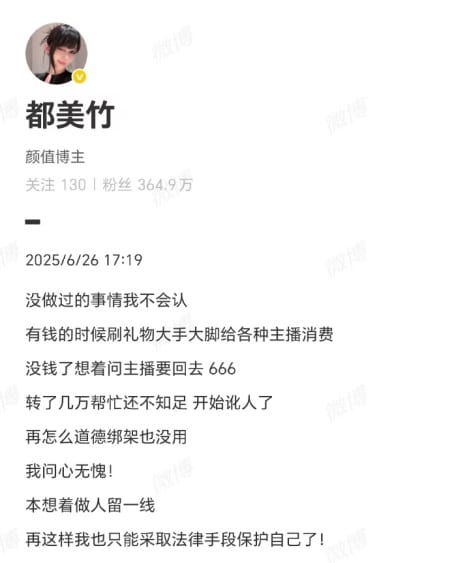
The post by Du Meizhu
The case has blown up online. One post by Ms. Zhu has already received over 133,000 likes and is still gaining traction.
But the developments surrounding the case are puzzling to some. Du Meizhu has long maintained a social media image of wealth, showcasing a lifestyle filled with Dubai travel, horseback riding, luxury food, and fashion. Why would she need to take money from a single mum? Du is being criticized not only for faking her wealth, but also for accepting so much money from a woman who clearly needed the money for her own family.

Du Meizhu social media photos.
Although the story is attracting a lot of attention online because it exposes private conversations between Du and the woman – and, frankly, many netizens just enjoy the drama, – it also says a lot about China’s thriving livestreaming industry and just how close online followers can feel to the influencers they follow. In these kinds of online communities, it is common for fans and followers to send livestreamers money or ‘virtual gifts’.
In the case of Ms. Zhu, some netizens doubt that she can prove in court that she loaned Du the money instead of gifting it to her. People also criticize Zhu: why did she spend so much money on an online influencer instead of on her own daughter?
Either way, many Chinese netizens feel that it was not right of Du Meizhu to take advantage of a single mum like that. Even if she’s not legally wrong, they feel she lacks moral integrity.
Du’s most recent social media post—featuring her in so-called “old money fashion” outfits—has only added fuel to the fire. Dozens of commenters flooded the post with demands that she repay Ms. Zhu. Though Du seemingly tried to delete the negative comments, they kept pouring in. “At this rate, there won’t be any comments left,” one user wrote.
Whether or not Du Meizhu ultimately faces legal consequences, the backlash is already taking a toll. She might escape the courtroom, but won’t be able to escape the court of public opinion.
By Manya Koetse
(follow on X, LinkedIn, or Instagram)
Spotted a mistake or want to add something? Please let us know in comments below or email us. First-time commenters, please be patient – we will have to manually approve your comment before it appears.
©2025 Whatsonweibo. All rights reserved. Do not reproduce our content without permission – you can contact us at info@whatsonweibo.com.
China Celebs
Earring Gate: Huang Yangdiantian and the 2.3 Million RMB Emerald Earrings
Online sleuths connect emerald earrings to post-earthquake business ties—sparking official investigations.
Published
6 months agoon
May 25, 2025By
Ruixin Zhang
Dear Reader,
This week, the Chinese internet exploded over a pair of earrings worn by a child actress.
In recent years, China’s netizens have been paying closer attention to so-called “nepo babies”—the children of the rich and powerful whose success often seems tied more to family connections than to talent.
Some, like Huawei’s heiress Yao Anna (姚安娜), have been criticized for using family ties to enter the entertainment industry. Others, like the infamous “Miss Dong” in the recent medical scandal, have sparked public outrage for abusing privilege to bend academic rules.
Facing economic difficulties and a tough job market, the public’s tolerance for nepotism and corruption is running increasingly thin. But when these issues touch on national trauma, including natural disasters and charity efforts, the public anger runs even deeper.
That’s why a Chinese teenage actress named Huang Yangdiantian (黄杨钿甜) recently found herself at the center of an online storm.
Earring Gate: Behind the Sparkle
Huang, born in 2007, started her career as a child actress in the 2017 historical drama Princess Agents (楚乔传).

She later gained more popularity by starring in other hit series, including Ruyi’s Royal Love in the Palace (如懿传), and also built an online following.
The recent scandal broke out after Huang shared a series of photos on Xiaohongshu, where she has around 328,000 followers. In the photos, meant to celebrate her 18th birthday, she’s seen proudly wearing a pair of sparkly emerald earrings. In the caption, she mentioned they belonged to her mom.
Sharp-eyed netizens quickly identified the earrings as a pair from the British luxury brand Graff—worth a jaw-dropping 2.3 million RMB (319,000 USD).

Digging deeper, online sleuths also found a Weibo post from 2018 showing Huang’s mother wearing a Cartier bracelet, which now retails for around 450,000 RMB (62,400 USD).
Considering Huang’s limited acting experience and modest earnings as a child actress, these luxury items raised eyebrows—and questions about where the family’s wealth was really coming from.
The “online detectives” didn’t stop there. They discovered that Huang’s father, Yang Wei (杨伟), was once a public official in Ya’an City (雅安市), Sichuan Province. After a major 7.0-magnitude earthquake struck Yan’an in 2013 (the Lushan Earthquake), Yang was reportedly involved in post-earthquake reconstruction projects, including investment and tendering.
Interestingly, in 2014, just a year after the earthquake, Huang’s family registered a film and culture company in Shenzhen with 5 million RMB (694,000 USD) in capital. Initially, the company’s legal representative was Huang’s uncle, followed by her mother in 2016. But after Yang resigned from public service, he took over as the official legal representative.
During the pandemic in 2020, Yang also registered a biotech company, which was later rebranded as a beauty and cosmetics trading business. The timing—one company during post-quake reconstruction, then another during a global health crisis—raised suspicions about whether Yang was using national emergencies as business opportunities.
It was also discovered that the Yang family currently lives in a luxury villa in one of Shenzhen’s most upscale neighborhoods, valued at over 100 million RMB (approximately 13.8 million USD).
How did Yang get enough money to start such companies and purchase a multi-million yuan villa? Even if all his official work and business ventures were legitimate, netizens pointed out it still wasn’t enough to explain the family’s enormous wealth.
Huang’s Father Responds, Netizens Dig Deeper
As the controversy grew, Huang’s father responded on May 16 via Weibo, using an account simply named “Huang Yang’s Dad” (黄杨爸爸).
In his post, he claimed that the emerald earrings were fake and of little value. He acknowledged having worked for the Yan’an government but denied any involvement in post-earthquake work, saying the online accusations against him were a case of mistaken identity—“just someone with the same name.” He even added, “I’ve never been corrupt—feel free to report me.”
But the “same name” defense didn’t hold up for long.
In a second wave of ‘detective work’ by online sleuths, netizens found a phone number listed under the name “Yang Wei” on a government website related to post-earthquake reconstruction projects in Ya’an. Some tried sending a small transfer to this number via Alipay, revealing that the profile picture linked to that account was a photo of Huang and her mother when she was younger, immediately making his “same name” explanation completely implausible.
Soon after, the account could no longer be found on Alipay, but because the number was likely tied to many services and platforms, it wasn’t easy to erase entirely. People quickly traced the same phone number to Yang’s accounts on other platforms. Around the same time, the legal representatives of the family’s companies were abruptly changed, only further fueling public suspicion.
Huang’s talent agency issued a statement calling the online rumors false but didn’t offer any concrete evidence to back that up.
By now, a local investigation by the Ya’an Discipline Inspection Commission has confirmed that Yang engaged in illegal business activities and that the birth of his second child (Huang’s younger brother) violated the one-child policy still in effect during his time as a government official. However, the investigation also denied any misappropriation of post-earthquake reconstruction funds. (link).
Most netizens find that many key questions are still left unanswered, and continue to investigate and dissect every single detail relating to Yang, Huang, and the earrings.
More than Online Gossip: Privilege & Public Grief
Some argue that the online speculation surrounding this case has now gone too far.
But for many Chinese netizens, especially younger ones, this isn’t just another scandal passively consumed by the so-called “melon-eating masses” (吃瓜群众). It strikes a nerve because it brings together several sensitive issues all at once.
Although China’s “nepotism babies” frequently spark backlash, they’re also everywhere, from business and entertainment to political and academic circles. For years, the fù èr dài (富二代), or “second-generation rich”—children of those who built fortunes after China’s economic reforms in 1978—have drawn criticism for flaunting wealth and behaving irresponsibly.
Through the years, new terms have been added to China’s nepotism lexicon: there’s xīng èr dài (星二代), referring to the children of celebrities; guān èr dài (官二代), a negative label for the children of government officials or bureaucrats; and hóng èr dài (红二代) and jūn èr dài (军二代), used to describe the children of political elites and military families.
Nepotism is closely tied to corruption—another painful issue in society that surfaces time and again. It’s particularly sensitive because it undermines more than just trust in (local) leadership; it erodes faith in meritocracy and leads the public to question the fairness of the entire system.
When these kinds of issues become entwined with national disasters and charity work—where the already privileged are seen to illegally profit from public grief for private gain—it becomes more than just a breach of public trust. It crosses a moral red line in the most extreme way.
For many young Chinese today, earthquake disasters are not distant history – they’re part of a shared collective memory that still strikes a nerve. In the comment sections of related news posts these days, many netizens recall donating money and supplies to earthquake relief efforts, now wondering whether their goodwill ever truly reached those in need.
The timing has only added fuel to the fire. The controversy erupted around the 17th anniversary of the devastating 2008 Wenchuan earthquake (5.12). Though that disaster is different from the 2013 earthquake, both struck Ya’an City, and public discussions has started to lump them together, bringing back old memories and concerns about disaster relief and public trust.
Back in 2009, Professor Deng Guosheng (邓国胜) from Tsinghua University studied where the 76.7 billion RMB (about 10.5 billion USD) in Wenchuan relief donations had gone. He found that nearly 80% of the money was controlled by the government or groups linked to it, like the Red Cross, with little transparency on how it was spent. People basically have no idea how the money they donated was spent.
In light of the recent controversy, Deng’s study and its numbers are being brought up again in many threads across Chinese social media. Today, as much as 15 years ago, the call for transparancy on how the public’s money is being used in the post-disaster time period is just as relevant.
One Weibo commenter wrote: “For context, in all of 2024, Ya’an City’s general public budget revenue was 8.4 billion RMB in total. This means that the total amount of donations and supplies after the 2008 earthquake was equivalent to 25 years of Ya’an’s current public budget revenue!” He later added: “It’s really not unreasonable at all for the public to ask questions about the authenticity of a pair of 2.3 million RMB earrings.”
Others agree: “It’s absolutely valid for everyone to focus on whether Huang Yangdiantian’s father was involved in embezzlement or bribery (..) When it comes to a tragic event like the Wenchuan earthquake, claims should especially be backed by solid evidence.”
The speculation about Huang’s family wealth goes well beyond celebrity gossip or a “nepo baby” narrative; it reflects a deeper call for clean governance and stricter oversight of how public and charitable funds are managed and spent.
As for Huang, the consequences of her glamorous photoshoot and the controversy it sparked are already unfolding. While her father has now become the target of further formal investigation by disciplinary authorities, it’s rumored that Huang has been removed as the female lead for the historical drama Peacock Bone (雀骨), as well as casting uncertainty over the viability of some of her upcoming projects.
At least we almost certainly know one thing: she won’t be wearing those earrings again any time soon.
Best,
Ruixin Zhang & Manya Koetse
Subscribe
Eye on Digital China is a reader-supported publication by
Manya Koetse (@manyapan) and powered by What’s on Weibo.
It offers independent analysis of China’s online culture, media, and social trends.
To receive the newsletter and support this work, consider
becoming a paid subscriber.

Get in touch
Have a tip, story lead, or book recommendation? Interested in contributing? For ideas, suggestions, or just a quick hello, reach out here.

Signals: Hasan Piker’s China Trip & the Unexpected Journey of a Chinese School Uniform to Angola

About Eye on Digital China — Powered by What’s on Weibo

China Trend Watch: Japan Tensions, Nexperia Fallout, Yunnan’s ‘Wild Child,’ & “Modern Opium”

Eye on Digital China: How Chinese Social Media Evolved from the Blog Era to the AI-driven Age

Trump and Takaichi: The Unexpected Love Affair

The Wong Kar-wai Scandal Explained: The Dark Side of ‘Blossoms Shanghai’

From Schadenfreude to Sympathy: Chinese Online Reactions to Charlie Kirk Shooting

From Nobel Farewell to ‘VIP Toilets’: What’s Trending in China

From Tents to ‘Tangping Travel”: New Travel Trends among Young Chinese

China’s “Post Parade Afterglow”: 6 Social Media Trends
Popular Reads
-

 China Memes & Viral4 months ago
China Memes & Viral4 months agoHidden Cameras and Taboo Topics: The Many Layers of the “Nanjing Sister Hong” Scandal
-

 China Insight7 months ago
China Insight7 months agoUnderstanding the Dr. Xiao Medical Scandal
-

 China Memes & Viral11 months ago
China Memes & Viral11 months agoOur Picks: Top 10 Chinese Buzzwords and Phrases of 2024 Explained
-

 China Digital10 months ago
China Digital10 months ago“Dear Li Hua”: The TikTok/Xiaohongshu Honeymoon Explained



